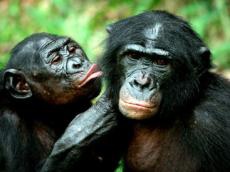|
|
TODAY.AZ / Weird / Interesting
Even apes have ‘midlife crises’
21 November 2012 [12:31] - TODAY.AZ
 Chimpanzees in a midlife crisis? It sounds like a setup for a joke.
Chimpanzees in a midlife crisis? It sounds like a setup for a joke.But there it is, in the title of a report published Nov. 19 in a scientific journal: “Evidence for a midlife crisis in great apes.”
So what do these apes do? Buy red Ferraris? Leave their mates for some cute young bonobos? Uh, no.
“I believe no ape has ever purchased a sports car,” said Andrew Oswald, an author of the study. But researchers report that captive chimps and orangutans do show the same low ebb in emotional well-being at midlife that some studies find in people.
Several studies have concluded that happiness in human adults tends to follow a certain course between ages 20 and 70: It starts high and declines over the years to reach a low point in the late 40s, then turns around and rises to another peak at 70. On a graph, that’s a U-shaped pattern. Some researchers question whether that trend is real, but to Oswald the mystery is what causes it.
Study results
He and co-authors assembled data on 508 great apes from zoos and research centers in the U.S., Australia, Canada, Singapore and Japan. Caretakers and other observers had filled out a four-item questionnaire to assess well-being in the apes. They found that the survey results produced that familiar U-shaped curve, adjusted to an ape’s shorter lifespan.
“We find it for these creatures that don’t have a mortgage and don’t have to go to work and don’t have marriage and all the other stuff,” Oswald said. “It is as though the U shape is deep in the biology of humans” rather than a result of uniquely human experiences.
/AP/
URL: http://www.today.az/news/interesting/115473.html
 Print version
Print version
Views: 1824
Connect with us. Get latest news and updates.
See Also
- 19 February 2025 [22:20]
Visa and Mastercard can return to Russia, but with restrictions - 05 February 2025 [19:41]
Japan plans to negotiate with Trump to increase LNG imports from United States - 23 January 2025 [23:20]
Dubai once again named cleanest city in the world - 06 December 2024 [22:20]
Are scented candles harmful to health? - 23 November 2024 [14:11]
Magnitude 4.5 earthquake hits Azerbaijan's Lachin - 20 November 2024 [23:30]
Launch vehicle with prototype of Starship made its sixth test flight - 27 October 2024 [09:00]
Fuel prices expected to rise in Sweden - 24 October 2024 [19:14]
Turkiye strikes terror targets in Iraq and Syria - 23 October 2024 [23:46]
Kazakhstan supplied almost entire volume of oil planned for 2024 to Germany in 9 months - 23 October 2024 [22:17]
Taiwan reported passage of Chinese Navy aircraft carrier near island
Most Popular
 What von der Leyen doesn't know about. Or doesn't want to know
What von der Leyen doesn't know about. Or doesn't want to know
 Culture Minister meets with Kyrgyz counterpart in Bishkek
Culture Minister meets with Kyrgyz counterpart in Bishkek
 Japan grants $3 billion loan to Ukraine using profits from frozen Russian assets
Japan grants $3 billion loan to Ukraine using profits from frozen Russian assets
 At least 148 dead after boat accident on DR Congo river
At least 148 dead after boat accident on DR Congo river
 Uzbekistan, South Korea discuss easing visa rules, expanding seasonal work opportunities
Uzbekistan, South Korea discuss easing visa rules, expanding seasonal work opportunities
 Trump sees hope for Ukraine-Russia deal, analysts remain skeptical
Trump sees hope for Ukraine-Russia deal, analysts remain skeptical
 Syria president hosts Republican US congressman in Damascus
Syria president hosts Republican US congressman in Damascus
